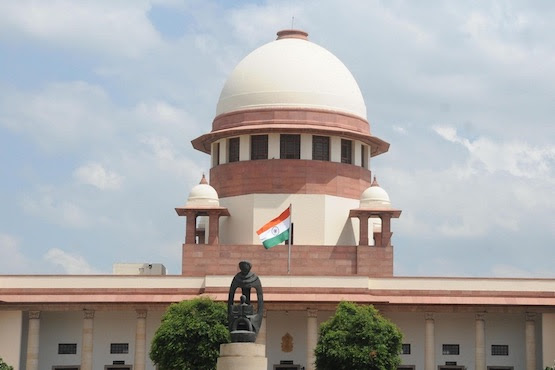India demands alternative execution methods to hanging
Mangalore Today News Network
Oct 14, 2017: The Supreme Court of India has asked the government to find less painful alternatives to hanging, but critics want an end to all executions. Franklin Caesar Thomas, a Delhi-based lawyer, welcomed the Supreme Court suggestion.

He noted that many nations have replaced hanging with lethal injection or electrocution. But Joseph Dias, founder of the Mumbai-based Catholic Secular Forum, told media that most advanced nations had abolished the death penalty entirely and instead opted for life imprisonment.
Dias said the death penalty did not prevent crime. Life imprisonment was adequate to regulate society and gave criminals an opportunity to mend their ways, he added.
The Supreme Court on Oct. 6 noted that a more dignified method of execution was needed as a convict should be allowed to "die in peace and not in pain". The court’s finding was in response to a plea filed by lawyer Rishi Malhotra challenging use of the hanging method to carry out death sentences.
Law in India requires that a condemned person be hanged by the neck until dead. Since 1995, capital punishment has been carried out only five times in India with the latest occasion being that of Pakistani terrorist Mohammed Ajmal Amir Kasab. He was executed in November 2012.
Kasab was convicted of involvement in the 2008 Mumbai terror attacks that killed 160 people. Mohammed Afzal Guru was hanged in February 2013 for his involvement in a 2001 attack on the Indian Parliament using automatic weapons in which 14 people died.
In 2007, India voted against a United Nations General Assembly resolution calling for an international moratorium on the death penalty. Later, in 2012, India voted against a UN General Assembly draft resolution seeking a global ban on capital punishment.
Jagmati Sangwan, founder of the All India Democratic Women’s Association, told media that the Supreme Court’s request for the finding of alternative methods of execution to hanging is a very positive step. "The manner of hanging in India is indeed cruel," she said.
- Balakrishna Poojary murder case: HC grants bail to accused
- SCDCC Bank reports ₹110.4 crore gross profit for 2024-25, records 39.59% growth
- Belthangady: Heavy rains in Belthangady
- Waqf bill clears Lok Sabha with 288 votes in favour, 232 against
- Minimum-age restriction forces at least 5 lakh UKG kids to repeat class
- Nethravati bridge work hits traffic movement between Pumpwell and Thokkottu on NH 66
- Five villages in Karnataka to be developed as Climate Resilient Coastal Fishermen Villages: Union Minister
- Bajpe: Thieves break into house; decamp with jewellery worth Rs 80 lakhs
- Blessings of the renovated chapel at Queen of Apostles Convent at Vamanjoor
- Mangaluru: Network issue due to jammers at district prison; technicians conduct inspection
- Mangaluru: Speeding bike fatally knocks down pedestrian on Airport road
- Suratkal Inspector, SI and 2 others chosen for CM’s Medal
- Chikkamagaluru: Man kills 3 family members, self in Khandhya hobli
- Kalaburagi: Man kills wife, children. Then dies by suicide
- Widow files complaint against three of rape in bus in Vijayanagar
- New Karnataka Bhavan inaugurated in Delhi by CM Siddaramaiah
- Lok Sabha sits a marathon 15:41 hours to clear Waqf Bill, Manipur President Rule
- Bengaluru girl dies after mistakenly drinking herbicide
- President Trump announces 27% reciprocal tariff on India
- Indian Navy seizes 2,500 kg narcotics in Western Indian Ocean
- Two women Naxalites killed in encounter in Madhya Pradesh’s Mandla district
- Days after mega delimitation huddle, MK Stalin’s letter to PM Modi
- Pak Army crosses Line of Control, opens fire, India retaliates: Army sources
- High Court stays FIR against Yatnal on his remarks against Ranya Rao
- Internet cafe sealed for downloading, distributing pirated version of ’Empuraan’
- Skills and Competencies Take Center Stage at MSN Dialogue Series
- Court remands Maoist Lakshmi to six-day police custody
- Sandhya Shenoy honored with Society for Materials Chemistry Medal-2024
- White Cornus Apartment in Mangaluru
- City girl wins first place in state-level spell bee competition
- Alleged ‘Love Jihad’ Case in Mangaluru: Woman left home voluntarily, says police
- Girl fatally struck by reckless two-wheeler near Belman
- New residential complex for the judges inaugurated in Mangaluru
- Absconding accused nabbed after 8 years
- Truck with cylinders turns turtle in Beltangady
- Bhoota Kola artist dies of cardiac arrest
- Development of the country should be our goal: Ganesh Karnik
- Container truck gets stuck under Modankap railway bridge
- Truck crushes bike’s pillion rider near BC Road
- Head constable dies of heart attack
- CITY INFORMATION
- TRAVEL
- TOURIST INFORMATION
- HEALTH CARE
- MISCELLANEOUS




 Write Comment
Write Comment E-Mail To a Friend
E-Mail To a Friend Facebook
Facebook Twitter
Twitter  Print
Print 


